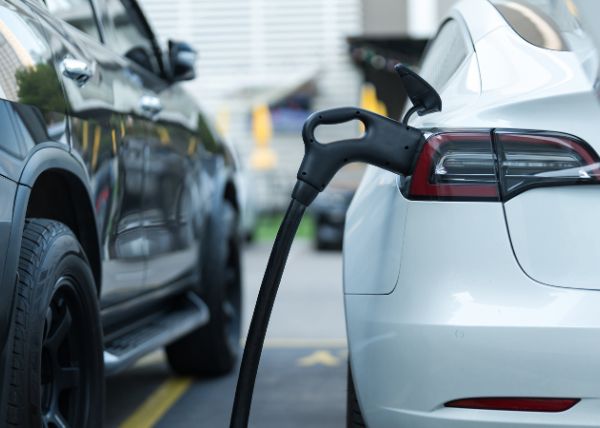Menu
Boise:
Sacramento:
Boise:
Sacramento:

Electric vehicles (EVs) are becoming increasingly popular on our roads, offering environmental benefits and cutting-edge technology. However, as Boise's leading personal injury attorneys, we at Meyer Injury Lawyers want to raise awareness about some unique dangers that electric car accidents can pose. While EVs are generally safe, certain factors can make accidents involving them potentially more hazardous than those with traditional gas-powered vehicles.
Here are just some of the ways electric cars can be more dangerous:
One of the most notable features of electric cars is their near-silent operation, especially at low speeds. While this reduces noise pollution, it can also increase the risk of accidents with pedestrians, cyclists, and other motorists who may not hear the vehicle approaching. This silent threat is particularly dangerous in parking lots, residential areas, and other low-speed zones.
Large, high-voltage battery packs power electric vehicles. In the event of a severe collision, these batteries can pose significant risks:
EVs typically have a lower center of gravity due to their heavy battery packs located in the vehicle's floor. While this can improve handling, it may also affect how the vehicle behaves in a collision, potentially leading to different crash dynamics than conventional cars.
The advanced technology in electric vehicles can make repairs more complex and potentially more expensive. This complexity may lead to longer repair times, keeping affected individuals without transportation for extended periods.
As electric vehicles are relatively new, some first responders may not be fully trained in handling EV-specific accident scenarios. This lack of experience could potentially lead to delays or complications in rescue operations.
While not directly related to physical accidents, the increased connectivity of electric vehicles introduces potential cybersecurity risks. In theory, a hacked vehicle could be manipulated to cause an accident, adding a new dimension to road safety concerns.

While electric vehicles (EVs) present unique challenges, manufacturers are continually developing advanced safety features to address these concerns and enhance overall vehicle safety:
Many EVs are equipped with external speakers that emit low-level noise at slow speeds, alerting pedestrians and cyclists to the vehicle's presence.
Advanced battery management systems and reinforced enclosures help prevent battery damage and contain potential fires in collisions.
In the event of a crash, many EVs automatically disconnect the high-voltage system, reducing electrocution risk.
The unique design of EVs, with batteries often placed in the floor, allows for enhanced crumple zones and overall structural rigidity.
Many electric vehicles feature cutting-edge safety technologies such as autonomous emergency braking, lane departure warnings, and adaptive cruise control.
Some EVs can receive software updates remotely, continuously improving safety features and quickly addressing identified issues.
EV manufacturers are implementing robust cybersecurity protocols to protect against potential hacking attempts.
The placement of heavy battery packs on the vehicle's floor results in a lower center of gravity, improving stability and handling.
These safety features, combined with the inherent benefits of electric powertrains, often make EVs some of the safest vehicles on the road. However, while technology continues to advance, safe driving practices remain crucial for preventing accidents and ensuring road safety for all.
As electric vehicles (EVs) become more prevalent on our roads, the legal landscape surrounding EV accidents is evolving. At Meyer Injury Lawyers, we stay at the forefront of these changes to provide the best representation for our clients in Boise. Here are some key legal considerations in electric car accident cases:
We have experience in electric vehicle (EV) accident cases, offering experience crucial for fair compensation and proper representation. Here's how we can assist you:
We stay current with EV technology, regulations, and legal precedents, allowing us to identify unique factors that may impact your case.
Working with EV specialists, we analyze vehicle data logs and battery systems to build a strong case based on technical evidence.
We navigate the complex liability issues in EV accidents, identifying all potentially responsible parties, from manufacturers to other drivers.
Understanding EV-specific insurance challenges, we negotiate effectively to ensure fair compensation for our clients.
Our network of EV technology experts, accident reconstruction specialists, and medical professionals provide crucial testimony to support your claim.
We consider all aspects of your losses, including unique factors like environmental remediation costs, to ensure you receive full compensation.
Our knowledge of EV safety standards, regulations, and recall information strengthens your case and helps establish liability.
As EV law evolves, we're prepared to set precedents and argue novel legal theories to protect your interests.
We explain complex technical and legal concepts clearly, keeping you informed and confident throughout the process.
While we aim for favorable settlements, our courtroom experience with EV cases ensures we're prepared if litigation becomes necessary.
Don't navigate the complexities of an EV accident alone. At Meyer Injury Lawyers, we have the experience to handle your case effectively. Contact us today for a free consultation. Let us put our knowledge to work for you and ensure you receive the compensation you deserve.

Attorney Advertising | Prior results do not guarantee a similar outcome. The information on this website is for general information purposes only. Nothing on this site should be taken as legal advice for any individual case or situation. This information is not intended to create, and receipt or viewing does not constitute, an attorney-client relationship. This site is protected by reCAPTCHA and the Google Privacy Policy and Terms of Service apply.